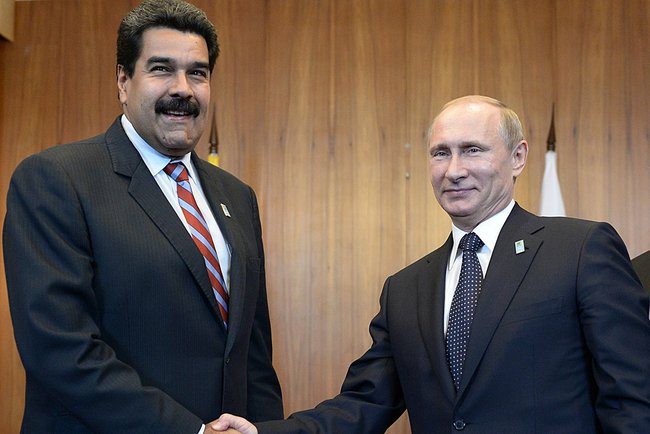 Photo Courtesy: The Presidential Press and Information Office of Kremlin.ru
Photo Courtesy: The Presidential Press and Information Office of Kremlin.ru
Russia is Putting Down Roots in America’s Backyard
While the United States’ foreign policy agenda has prioritized the Asia-Pacific and MENA regions in recent years, Russia has increasingly turned its attention toward the U.S.’ own backyard: Latin America and the Caribbean (LAC). Vladimir Putin has not masked his intentions to expand Russia’s influence throughout the region, where populist anti-U.S. movements have created an opening for foreign incursion.
Russia’s involvement in the LAC poses a threat to regional stability. In a year when many Latin American states are conducting elections and reeling from the double impact of COVID-19 and natural disasters, Russia’s authoritarian influence and weaponization of disinformation could hasten democratic backsliding, imperil hemispheric security, and directly impact the U.S. by exacerbating irregular migration flows and upholding adversarial governments. The Biden administration cannot ignore Russia’s partnerships in the LAC region and should ensure that Moscow does not foment instability among America’s southern neighbors.
The Rise of Russia’s Authoritarian Influence in the LAC Region
Russia‘s involvement in Latin America has focused around ideological and Cold War-era allies Venezuela and Nicaragua—countries home to authoritarian governments adversarial to the U.S.
Venezuela:
Russia developed a close relationship with Venezuela during the Hugo Chávez era that has persisted to the present day. Over the past several years, Russia’s presence in Venezuela has presented a heightened security threat as the country’s ongoing political turmoil has deepened. Throughout Venezuela’s crisis, Moscow has played an important role in propping up the authoritarian Nicolás Maduro regime with diplomatic, security, and economic support. This has been especially helpful to Maduro considering the U.S.’ stringent Venezuela sanctions program. With no end in sight to Venezuela’s crisis, it is unlikely that Putin will discontinue his support for the Maduro regime anytime soon.
In addition, Moscow has attempted to expand its influence in Venezuela through disinformation. Through expanded Spanish–language state-financed Russia Today broadcasting, Moscow exports the narrative that Russia is a victim of Western hostility and utilizes information warfare to promote its actions as beneficial and U.S. actions as deleterious.
Nicaragua:
Nicaragua and Russia have enjoyed close relations since the Sandinista Revolution, when then-leader of the Frente Sandinista de Liberación National Daniel Ortega forged Nicaragua into a USSR proxy state. When Ortega returned to the presidency in 2007, he rekindled Nicaragua‘s Russian ties. For example, Ortega supported pro-Russia factions in the armed conflict over South Ossetia, opened a consulate in Crimea in November 2020, and granted Russia permission to dock warships in Nicaraguan ports with little prior notice. In exchange, Russia has provided Nicaragua with food, aid dollars, and infrastructure.
While Russia no longer represents the same concern it did during the Cold War, its relations with Nicaragua still constitute a threat to regional security and have grown increasingly militarized over time. Nicaragua sourced 90% of its arms imports from Russia between 2000 and 2018, and in November 2017, Russia opened a joint counter-narcotics center in Nicaragua’s capital. Further, the Ortega regime has relied on Russia as a supporter of its authoritarianism and an example on silencing dissent. Nicaragua’s Foreign Agents Law, passed in late 2020 to curtail civil society and opposition voices ahead of November 2021 elections, mirrors Russia’s own efforts. As election season and the three-year anniversary of nationwide anti-government protests approach, Ortega will certainly lean on Moscow to solidify his position.
The COVID-19 Pandemic: A Tool for Russian Influence in the LAC
Russia has capitalized on the pandemic to expand its influence in the LAC region through vaccine diplomacy. COVID-19 enabled Moscow to revive relations with Argentina’s current vice president and former Putin-friendly president Cristina Fernández de Kirchner, who petitioned Argentina to purchase Russia’s Sputnik V vaccine. Seeing Argentina’s positive reception of Sputnik V, Mexico signed a deal to buy 24 million doses. Nicaragua recently selected Sputnik V as its first approved vaccine. In partnering with LAC countries to respond to the pandemic, Russia has presented itself as a leader in global health governance at a time when the U.S. has been less forthcoming in supplying vaccine doses abroad.
The Importance of U.S.-LAC Engagement
Moscow’s gains in the region cast the U.S. in a negative light and threaten the U.S.’ role as an ally to its southern neighbors, furthering movements like ALBA that view the U.S. as an enemy state. Further, Russia‘s involvement in the LAC region has upheld authoritarian regimes, threatening economic, social, and political instability that could reach the U.S. in the form of outward migration flows. The U.S. cannot afford to ignore Russia’s presence in the LAC region and should engage the region to curb Russia‘s authoritarian influence.





